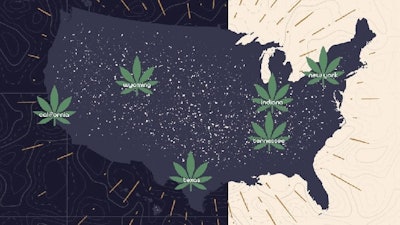

The hemp market has suffered commercial setbacks since 2019, but one area of hemp that thrived in that time—and continues to do so—is smokable hemp. According to data compiled by industry data and intelligence firm Hemp Benchmarks, it is the only hemp category tracked by the company that experienced price increases on a year-over-year basis in 2020. The assessed price for smokable cannabidiol (CBD) flower in May 2021 surpassed $300 per pound for the first time since October 2019, and “prices for observed deals for smokable CBG flower averaged $284 per pound, up over 50% from [April 2021],” according to the firm.
Unfortunately, while the Agriculture Improvement Act of 2018 (the 2018 Farm Bill) legalized hemp nationwide, some states still treat hemp flower like an illicit substance. The volatile regulations across the country place unwarranted constraints on hemp flower’s market potential. In addition, it penalizes people who want to smoke hemp for cannabinoids like CBD—including those using smokable hemp to kick their tobacco cigarette habit.
A closely watched court case in Indiana had the potential to deliver at least some measure of legal progress for the industry. The case, C.Y. Wholesale, Inc. et al. v Holcomb et al, first emerged after the plaintiffs, a group of hemp and CBD companies, sued Indiana in 2019 in the wake of Senate Enrolled Act 516. The measure effectively criminalized smokable hemp in the state. The reasoning? As legal hemp and illegal cannabis are roughly identical in appearance, law enforcement would not be able to tell the difference between hemp and cannabis flower, thus making it easier for cannabis growers to skirt the law. (Neither medical nor adult-use cannabis are legal in Indiana.)
The plaintiffs argued that the 2018 Farm Bill legalized hemp production, and the state had no right to make it unlawful. A district court granted the plaintiff’s request for an injunction and rejected the ban. But in July 2020, the U.S. Court of Appeals for the Seventh Circuit ruled that the injunction “sweeps too broadly.” The 2018 Farm Bill, the court said, gives states the right to enact rules regarding hemp that are stricter than those in the farm bill. The circuit court ordered the case back to district court.
In May, the plaintiffs dropped the case. A court filing says the plaintiffs decided to focus on their businesses rather than continue the legal battle.
House Bill 1224 would have rendered their battle moot if passed. The Indiana House voted earlier this year to pass the bill, which would have repealed the ban on smokable hemp flower. But the legislative session ended before the Indiana Senate could vote on it.
With the battle over smokable hemp in Indiana now at a standstill, the product continues to lack a national legal foundation.
What is the state of smokable hemp? It’s all over the map. Smokable hemp is illegal in a handful of states, including Idaho, Iowa, Kentucky and Massachusetts. Other states, such as Colorado and Vermont, place no restrictions on smokable hemp.
And then there are states that experienced fresh legislative and legal attention in 2021. Let’s take a look at what happened in different states so far this year on the smokable hemp front.
Texas
Indiana’s smokable hemp journey involved detours, roadblocks and a constant fog of uncertainty. The situation is similar in the Lone Star State.
A year after the 2018 Farm Bill legalized hemp, Texas Gov. Greg Abbott signed House Bill 1325, which confirmed that in Texas, hemp was legal. But in August 2020, the Texas Department of State Health Services outlawed smokable hemp products. Shortly after, a group of hemp companies sued the state. The case has been stuck in district court ever since.
As with Indiana, a district court judge imposed a temporary injunction (restriction) on the ban. A March hearing did not resolve the issue. For now, at least, the injunction on the ban remains in place, and smokable hemp sales are still permitted in the state.
Editor's note: Just days after the August issue of Hemp Grower went to press, a Texas court partially reversed the state’s pause on a smokable hemp ban, allowing for the sale and distribution of these products but prohibiting their production.

New York
In November 2020, New York regulators proposed updated regulations for the hemp industry. Included among them was a ban on the sale of hemp flower. Unsurprisingly, that part of the proposed regulations was especially controversial in the Empire State.
In May, after months of public comments, the state issued new guidelines with updated rules surrounding smokable hemp. In short, New York keeps the proposed ban in place, but only for hemp flower products that are “clearly labeled or advertised for the purpose of smoking.” This prohibits things like hemp cigarettes, cigars and pre-rolls. Licensed shops can sell hemp flower, however, as long as it is not advertised as a smokable product.
Wyoming
In February 2021, the Wyoming legislature proposed a bill that would prohibit the sale of smokable hemp to anyone under the age of 21 and ban using smokable hemp in public. The bill was voted down in the state Senate 20-9, however, with one senator excused.
California
California legislators are considering banning smokable hemp through two parallel bills: Assembly Bill 45 and Senate Bill 235. The pressure to ban smokable hemp in the Golden State, however, comes less from law enforcement and more from a sister industry: legalized cannabis.
At issue is the swiftly growing marketplace for delta-8 tetrahydrocannabinol (THC) products, which are derived from hemp but offer psychoactive experiences somewhat similar to those associated with cannabis. While delta-8 is found in only minuscule quantities in hemp, it can be chemically converted from CBD to yield larger volumes.
Because hemp flower offers many strains that are high in CBD, the cannabis industry’s concern with smokable hemp flower is that much of it will be converted into delta-8 products. Because cannabis and delta-8 products are psychoactive, the cannabis industry views delta-8 as a competing industry. (Editor’s note: In some cases, delta-8 is also competing with CBD. See “Hemp Watch” for more information.)
Also, since delta-8 can be derived from legal hemp, it is being sold in stores like convenience shops in states across the country (except in at least 14 states that have restricted delta-8 product sales as of press time). Cannabis products, on the other hand, endure intense regulatory oversight and can only be sold through licensed dispensaries.
Until a final bill passes—and political experts anticipate that one will pass—any store can sell smokable hemp in California.
Editor’s note: Cannabis regulators across the country have raised questions about delta-8’s safety and prevalence. In July 2021, Washington state’s cannabis regulation agency, the Washington State Liquor and Cannabis Board (WSLCB), “filed a pre-proposal statement of inquiry.” Out of a concern for public health and youth access, the agency is considering, among other things, adding a rule section that would allow it to look into the conversion of hemp and CBD into delta-8 THC. And in June, in Ohio, medical cannabis regulators announced they would require labeling of delta-8 amounts in products.
Tennessee
Smokable hemp is legal in Tennessee. But in January of this year, the state upped the age limit for the sale of smokable hemp and hemp vaporizers from 18 to 21.
Smokable Flower’s Place in the Market
Our view is laws banning smokable hemp are arbitrary and unlawful. Hemp—including the plant’s stalks, leaves, chemical components and, yes, flower—has been legal nationwide since December 2018.
The smokable sector of the hemp industry offers tremendous commercial promise for farmers, manufacturers and retailers. But still, nearly three years since former President Trump signed the 2018 Farm Bill into law, lawmakers in states across the country continue interfering with hemp’s legal status. Smokable hemp, unfortunately, has emerged as a particularly tempting target.


















